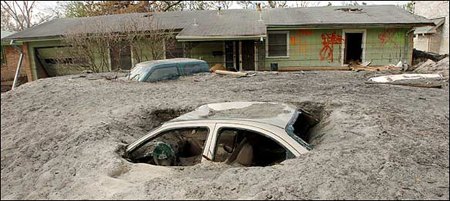Meizhu Lui: Racism and the "Internal Combustion Divide"
Would Rosa Parks have been able to hop a bus and escape New Orleans ahead of Hurricane Katrina if she'd been in town in 2005? It’s a pretty convoluted way to start a rant, but The Black Commentator guest columnist Meizhu Lui says Hurricane Katrina exposed the "internal combustion engine" divide. Forgetting the fact that Amtrak was deadheading [empty] trains out of town and that New Orleans had lots full of [empty] school buses, Lui flags the “alarming disparity in car ownership that literally was the difference between life and death for many Gulf Coast residents." The author then cites a “recent report” claiming that 24 percent of black households don’t own a car– as opposed to seven percent of white and 17 percent of Latino households. Rather than calling for expanded car ownership, Lui says there’s a better alternative. “Hurricane Katrina not only dramatically revealed the grotesque racial and class divisions in our country, but also pointed to some obvious causes, such as our car dependent economy. An inclusive and dependable public transportation system should be at the top of the list.”
[Martin Schwartz of Vehicles for Change provides an alternative view of the benefits of car ownership for low-income people in the podcast with RF below]Glenn is a baby-boomer, born in 1954. Along with his wife, he makes his home in Connecticut. Employed in the public sector as an Information Tedchnology Specialist, Glenn has long been a car fan. Past rides have included heavy iron such as a 1967 GTO, to a V8 T-Bird. In between those high-horsepower cars, he's owned a pair of BMW 320i's. Now, with a daily commute of 40 miles, his concession to MPG dictates the ownership of a 2006 Honda Civic coupe which, while fun to drive, is a modest car for a pistonhead. As an avid reader, Glenn enjoys TTAC, along with many other auto-realated sites, and the occasional good book. As an avid electronic junkie, Glenn holds an Advanced Class amateur ("ham") radio license, and is into many things electronic. From a satellite radio and portable GPS unit in the cars, to a modest home theater system and radio-intercom in his home, if it's run by the movement of electrons, he's interested. :-)
More by Glenn Swanson


































Comments
Join the conversation
Sorry, Adonis. Did they say $2000 towards a brand new car or $2000 toward any car? I was under the impression that they had to buy a new car. You can certainly get an excellent car for $2000. I bought my Saab for $1500 and it runs like a top and is very entertaining to drive. $2000 toward a brand new car, however, is merely a way to make some easy money disguised as a self-congratulatory pat on the back. I doubt that the benefits of owning a brand new car would outweigh the costs for a person making
Pch, We disagree once again. I find it kind of strange that you would think that a car that was just reconditioned by this group, and for which there is a likely trusted and cheap repair service available, would be more likely to be out of repair than anyone elses. Furthermore, if there is some problem with the insurance system, then perhaps we should address that. If you want to agree with me that the mandatory insurance law is just another example of big government passing useless laws that are poorly constructed and without ANY forethought in regard to issues other than appearing to "care", then maybe we can just agree on that.
"In any case, the lack of insurance is a factual data point, and one that doesn’t comfort me. If freedom is another word for nothing left to lose, then the low-income driver is the freest of them all. Unfortunately, his freedom comes at my expense." I beg to differ. We are not talking about low income drivers in general. We are talking about the drivers who go get accepted into this program.